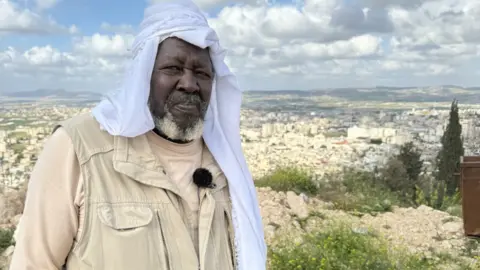The ongoing conflict and resultant humanitarian crises in the West Bank have reached alarming levels as Israel continues its campaign of demolishing Palestinian homes in the occupied territories. The situation has become increasingly dire for residents in the region, particularly in refugee camps such as Jenin, where large-scale demolitions and military operations have created a climate of fear and despair. This escalation is part of a broader context of military actions that have intensified since the outbreak of war in Gaza in October 2023.
One poignant story emerging from this troubling backdrop is that of Jumaa Zawayda, a 66-year-old resident of the Jenin refugee camp. Zawayda chose to remain in his home while during an operation initiated by Israeli forces that ordered many residents to evacuate. He believed that by staying, he could protect his home from potential damage. After three harrowing days filled with gunfire and explosions, Zawayda eventually made the difficult decision to leave when the mounting anxieties about lack of electricity, water, and communication became unbearable. Months later, he stands in the remnants of what was once a vibrant community, unable to ascertain the fate of his home amid ongoing Israeli military operations.
In the immediate term, the UN’s Palestinian refugee agency, UNRWA, reports that Israel has razed at least 260 buildings, thus displacing approximately 42,000 Palestinians since the beginning of 2023. Such demolitions have not only destroyed individual homes but have also systematically dismantled the basic infrastructure necessary for survival in refugee camps. One of the immediate effects is a massive humanitarian displacement that the region has not seen in decades, evoking memories of the 1948 conflict when many Palestinians were expelled from their homes during the formation of the state of Israel.
As the Israeli military claims that they are targeting militant groups operating from within these camps, local residents bear the brunt of the consequences. Officials say that about 150 fighters in the Jenin camp were a significant concern for Israeli defense forces. In efforts to combat these threats, Defense Minister Israel Katz has labeled refugee camps as “nests of terror” and has instructed military action aimed at demolishing buildings and preventing return access for displaced residents. Simultaneously, the population is left in a precarious position, grappling with the fundamental questions of their right to return to their homes, which are often their only sanctuary in the world.
Jumaa Zawayda is one such individual who faced this dilemma head-on. He managed to retrieve his identification card and family dog from his demolished home when Israeli officials allowed him a brief visit. However, as more time passes and the demolitions continue, the question of whether he has a home to return to looms larger. The Israeli military’s ongoing operations have systematically made areas where families once lived uninhabitable, thus contributing to heightened tensions and anxiety.
In recent months, UNRWA has confirmed the exigency of the situation, marking it as unprecedented, both in terms of the number of displaced individuals and the extensive levels of destruction. The aid agency’s West Bank director, Roland Friedrich, highlighted the lack of precedent since 1967, when Israel began its military occupation of the West Bank. The humanitarian crisis is exacerbated by inadequate access to information, as the Israeli blockade around refugee camps restricts the flow of news from the impacted areas.
Moreover, local governance has been significantly hindered by these military operations. The mayor of Jenin, Mohammad Jarrar, lamented the complete destruction of infrastructure that prevents municipal workers from delivering necessary services, emphasizing that the camp has become entirely unliveable. Reports indicate that humanitarian efforts to assess the destruction and aid displaced families remain stifled under strict military control.
As Jumaa reflects on his future, he expresses an unyielding determination to remain in Jenin despite the destruction. His statement encapsulates the resilience of many Palestinian families who have faced displacement before: “I won’t leave the camp. If they won’t let me rebuild my house, I will set up a tent in its place.” This determination is a testament to the broader plight of Palestinians, many of whom continue to fight for recognition and a right to return to their homes against insurmountable odds.
In conclusion, the recent wave of demolitions in the West Bank refugee camps marks a significant escalation in Israeli military operations. With thousands displaced and substantial infrastructure destroyed, the long-term humanitarian implications of these actions remain to be seen. The plight of individuals like Jumaa Zawayda serves as a painful reminder of the profound human cost embedded in this enduring conflict.



